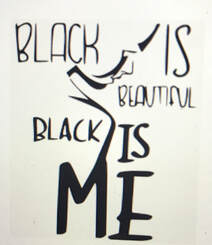
I observed my grand niece recently being called “Blackie” by some children in the community we visited, and saw her beginning to exhibit some non-ver al behaviors that made me think she was not comfortable with the name she was being called. Based on her facial expressions, the curve in her body structure, and the slow walk, it was enough to make me feel that she did not like the name. These children had invaded her comfortable space and had now made it uncomfortable. She was now in a space she was not comfortable in, and with children she was not comfortable with.
So what was I to do after observing this? I spoke briefly to the kids asking why they were calling her that name as opposed to the name other called her. They did not have a response but smiled timidly. I left them alone reminding them that in the future they should refer to her by her given name just like she does for them. We walked away smiling.
My second response was to ask questions. I let her alone for awhile to process the information and after a day decided to ask her about the interaction she had with the kids. I engaged her in a conversation that required her to respond to questions such as…
- Do you like the name Blackie?
- Why do you think they call you by that name?
- how did you feel when they called you “Blackie?”
I didn’t want to teller how to feel, I wanted to make her feel better than she felt when she was called by a name she did not like. After identifying/explaining the name the kids called her, we talked about the negative connotation attached to it, and how instead of feeling bad about it, what she could do to make the experience in the future be a more positive one. Here are some things we came up with if this ever occurred again. Instead of feeling bad and saying nothing or arguing with the other kids, try…
- Engage the kids in talking about the word, "Black”/“Blackie”
- Ask questions to give them a chance to explain why they were calling her by that name as opposed to her given name
- Explain that even though they wanted her to feel bad, they should think about how they could change their behavior into one that is more positive
- Explain that having “Black” skin is great
- Explain that she likes being a Black girl
- Explain that there is nothing wrong with being Black
I have to say that at the end off our conversation, and after observing my grand-niece, I felt a small shift in how she felt about the word and how she would respond to future encounters.
MY SKIN COLOR DOES NOT DEFINE ME…. I AM BEAUTIFUL… I AM LOVED…I LOVE ME
Some additional resources to explore….https://www.thebump.com/a/childrens-questions-about-skin-color
…https://www.good.is/articles/what-if-we-taught-kids-about-skin-color-and-racism-the-way-we-teach-math